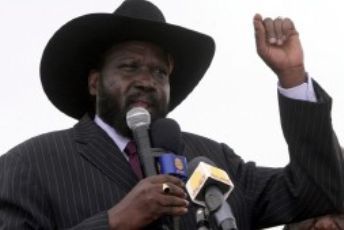South Sudan president regrets lack of regional support to stop islamization
May 16, 2012 (JUBA) – South Sudan president Salva Kiir on Wednesday expressed his disappointment in the regional support his country has received in its dispute with Sudan, saying his country is fighting the expansion of Islamic ideologies into neighbouring countries.

He further said that “The government in Khartoum once said we are the obstacle and if they can defeat us they will expand Islamisation and Arabisation up to South Africa.”. The South Sudan leader accused the regime in Khartoum of failing to make unity attractive during the 2005-2011 interim period of the peace deal that led to South Sudan’s secession.
Kiir explained that the SPLM manifesto calls for a secular state where “no religion is better than the other” and “no region and tribe should be better than the other” because “religion belongs to God” and the “land belongs to the general population”.
Khartoum and Juba’s armies clashed in April over the control of Heglig before the Sudanese army managed to take it back from the SPLA. But Juba says it withdrew its troops under international pressure. Heglig’s capture by the South Sudanese army was condemned by the whole international community.
The battle of Heglig is the culmination of a series of divergences on the outstanding issues particularly oil transportation fees, Abyei and border demarcation. The two countries also trade accusations of supporting rebel groups from both sides.
Salva Kiir deplored the international community’s “unwarranted statements” – in response to the South Sudan army’s takeover of Heglig, allegedly in response to repeated provocative attacks on areas he said were “deeply inside” South Sudan’s territories.
“Some people who do not know where our borders with Sudan lies rushed with irresponsible decisions and made unwarranted statements that we have crossed into Sudanese territory. What was their basis of condemnation?,” he said explaining further that this was what “necessitated withdrawal not because we were [the] aggressor.”
The two countries have to resume talks on the outstanding issues and security concerns during the upcoming days in a accordance with a roadmap designed by the African Union and supported by the UN Security Council (UNSC).
The international community and regional organisations are pushing the two sides to agree on the pending issues and stop their support to rebel groups. However, Khartoum still refuses to negotiate with the SPLM-North (SPLM-N) rebels fighting in Blue Nile and South Kordofan.
The dispute with the SPLM-N in South Kordofan is seen as one of the main causes of the current tension with Juba.
Kiir, however, said the Sudan government does “deserve thanks” for allowing the repatriation of South Sudanese stranded in Kosti via Khartoum. This was “the kind of cooperation we have always wanted to establish with them because we have a lot to share,” said Kiir.
(ST)
